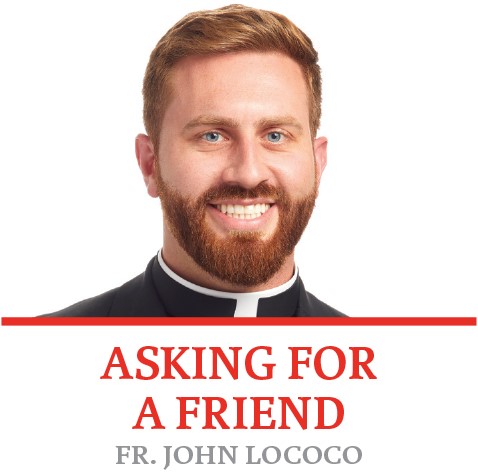Asking for a Friend
At the height of the pandemic, there were a lot of unique solutions proposed to continue to offer the sacraments to the people of God. From parking lot confessions to outdoor Masses, it seems everyone was trying their best to navigate uncharted ministerial waters.
One afternoon, I received a phone call directly to my office from a couple I had never personally met. They informed me that, due to the rising rate of infection and hospitalization, they had baptized their daughter at home and were wondering if the parish would issue a certificate.
After some inquiry, it seemed that the couple had just signed holy water on the forehead of the infant, neither intoning a desire for Baptism nor doing so according to the Triune God. I informed them that they had not, in fact, baptized their child but that I would be happy to do it. Furthermore, I assured them that I would take every precaution to ensure their health and the health of their infant.
Long pause. “Yeah, but if we wanted to still do it ourselves, how would we do it the right way?”
So, what is the right way to get baptized? Many of us in the Church (perhaps you, dear reader) know someone, usually a grandparent, that wants nothing more than for their grandchildren to be baptized. The pain of faithful Catholic parents knowing their children have abandoned their faith is only deepened by seeing their new grandchildren not even baptized.
The Catechism of the Catholic Church (1213) states: “Holy Baptism is the basis of the whole Christian life, the gateway to life in the Spirit, and the door which gives access to the other sacraments.” Shouldn’t we grant access to this door, no matter the circumstances?
In part, yes, we do. In danger of death or should grave necessity demand it, anyone who intends Baptism using water and the Trinitarian formula validly baptizes. In other words, anyone — even a non-Christian — can baptize.
But what if there is no grave danger? The 1983 Code of Canon Law states that for a lawful Baptism, “that the parents, or at least one of them, or the person who lawfully holds their place, give their consent” and also that, “there must be a founded hope that the infant will be brought up in the Catholic religion.” (canon 868 §1, 1°-2°)
The “founded hope” that the Church determines as a prerequisite for Baptism does not mean necessarily total, faithful practice. In fact, one could argue the grandparents’ involvement in the grandchild’s practice of the faith would be sufficient cause for hope. But what is clearly lacking would be consent of the parents, so for this reason, Baptism is not to be conferred secretly.
So, what is a grandparent to do? Importantly, one should remember that Baptism is a “priceless grace” (CCC 1250) that should be conferred shortly after birth. That their parents have omitted this grace does not indicate malice, but ignorance. Who among us would willingly deny such a priceless grace to the newest addition to our own family?
The real work of conversion means less focus on their omission as parents, but more focused attention to the gift they already possess. A famous legal axiom states, “Nemo dat quod non habet”; literally, “no one can give what they do not have.” In other words, these parents cannot give the priceless gift of baptism to their children — your grandchildren — until they can come to see the priceless gift which they themselves possess. Seeing it and coming to understand its value is what will finally lead to imparting it upon their own children.
Simply nagging them to baptize your grandchildren will almost always prove fruitless. Instead, be more positive and inviting than condemnatory. Then let the light of faith in your heart soften their hearts to see the love Christ has for them. As St. Paul reminds us, it is God who gives the growth (1 Corinthians 3:6), so the best that we can do is not get in the way. Instead, as St. Peter challenges us, we must “always be ready to give an explanation to anyone who asks you for a reason for your hope.” (1 Peter 3:15) Share with them your experience of this priceless gift and trust always in the Lord’s time and plan for your life and the lives of those you love.

